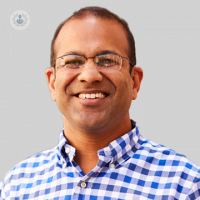Are liver cysts a sign of liver cancer?
Autore:Professor Hemant Kocher, renowned consultant general, laparoscopic and hepato-pancreato-biliary surgeon, is here to provide an expert insight into liver cysts, including possible causes, treatment, and cancer risk.

What are liver cysts?
Cysts are small abnormal collections filled with fluid. Cysts that are present in the liver are called liver cysts, as the name implies.
Most of the time, the fluid in liver cysts is clear and nothing to worry about - this type of cyst is therefore called a simple liver cyst.
The remaining types of cysts are considered complicated liver cysts.
How do liver cysts form?
Most simple liver cysts are congenital, meaning that people have them from birth. Despite this, liver cysts can develop or grow bigger (and thus, become visible) later on, usually found when a scan is performed for a separate health concern.
Other types of liver cysts can form due to infection, cancer, or (rarely) pre-cancerous conditions.
Hence, it is important to, again, distinguish between a simple liver cyst that is very common and the complicated liver cysts that are, thankfully, uncommon.
Who is most at risk of developing liver cysts?
Everybody can be affected by liver cysts. My estimation is that around five per cent of the general population has a liver cyst but they are just unaware, because not all patients require a scan when they visit a doctor. As scans are increasingly performed for other reasons, these may incidentally reveal more liver cysts.
Complicated liver cysts are generally caused by a parasitic infection that develops, for example, after drinking unsafe water or eating unsafe food. Rarely, complicated cysts can also develop following cancerous transformation within the liver.
How are liver cysts removed?
Most liver cysts do not need to be removed. Actually, they can be left alone.
However, simple liver cysts that become large enough to cause symptoms do need to be removed. This removal is generally performed through keyhole surgery, which is pretty straightforward and easy to do in capable hands.
On the other hand, complicated liver cysts that need surgery may require a more involved liver operation that has to be carried out by a specialist doctor.
What could happen if liver cysts are not removed quickly enough?
Most liver cyst do not need to be removed, but if they are big enough, then they can cause pressure symptoms, including pain and bleeding. Very rarely, these liver cysts can rupture as well.
The most important thing is to distinguish simple liver cysts from the complicated liver cysts.
Are liver cysts a sign of liver cancer or liver failure?
Liver cysts are not a sign of liver cancer or liver failure. They can be incidental and most often simple liver cysts that are nothing to worry about.
One only has to be vigilant and be able to differentiate between very common simple liver cysts and complicated uncommon liver cysts.
If you require expert treatment and management for a liver cyst, do not hesitate to visit Professor Kocher’s Top Doctors profile today.


